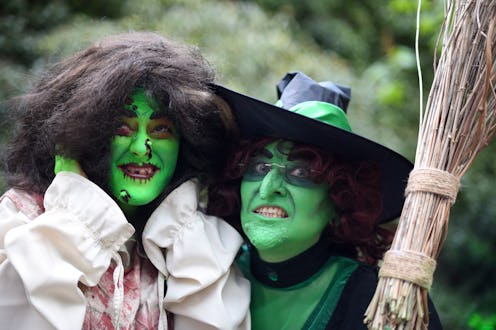Although zombies, werewolves, and vampires might make the cut of things that scare us on Halloween, the witch holds a special place in the hall of horrors, because what's more frightening than unbridled female power? In history and in pop culture, the witch both reflects and threatens societal views about women, which is why the witch is a feminist icon for the ages.
In Europe between the fourteenth and eighteenth centuries, thousands of women (and some men) were accused of witchcraft and put to death. Some were healers and midwives who had knowledge of the female body and the potential to heal and educate the population about sexual reproduction. Some were women who raised suspicion by failing to conform to the social and sexual norms of the time, and some were everyday women accused for no reason other than being female.
This persecution continued to a lesser degree in North America during the Salem witch trials of the 1690s, but today in the West, the witch has been largely relegated to film, television and literature. Ask anyone who their favorite fictional witch is, and they'll likely have an answer at the ready. Like women, the witch has infinite variations in aesthetic and personality, and like women, she is often maligned and misunderstood. Here are five feminist witches to celebrate, because there's no time like Halloween to do so.
1. Willow Rosenberg
While she may have started out the series as a shy, nerdy sidekick, this witch grew into her powers and became one of the most complex and beloved female characters on Buffy The Vampire Slayer. Bonus points for the realistic portrayal of her relationship with Tara Maclay: queer lady witches unite!
2. Maleficent
While the original Maleficent in Disney's Sleeping Beauty embodies all the cliches about angry, vengeful, jealous women, Maleficent in the 2014 adaptation is far more nuanced. She overcomes her own traumas to forge a lasting bond with another woman in a testament to the transformative potential of female friendship.
3. Samantha Stephens
Samantha Stephens of Bewitched marked a sea change in pop culture representations of the witch. Although the blonde, bubbly mischief-maker may not seem radical today, at the time she challenged the ways a housewife could have agency and power in a traditional relationship.
4. Hermione Granger
While representations of the witch are often highly sexualized, Hermione's character in the Harry Potter series countered that cliche by eschewing image and focusing on intensive study as a path to personal empowerment.
Images: Willow Rosenberg/Wikipedia; Maleficent/Wikipedia; Bewitched/Wikipedia; Hermione Granger/Wikipedia
